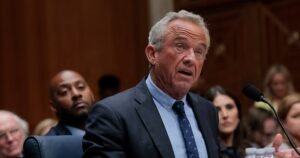What to know as economic uncertainty persists

The pace of jobs growth in the United States most likely slowed in April as economic uncertainty ramped up.
The Bureau of Labor Statistics is set to report the latest payrolls data Friday morning. Forecasts were for an increase of about 133,000. That would be down from the 228,000 jobs added in March but closer to historical monthly averages. The unemployment rate was forecast to have stayed unchanged at 4.2%.
In the run-up to Friday’s report, there was debate about how much of the fallout from President Donald Trump’s “Liberation Day” tariffs speech April 2 — and subsequent pause of those country-by-country tariffs — the new data would capture.
While the tariffs announcement generated massive uncertainty and sent markets tumbling, some of the worst of the impact, as seen in slowing port shipments and stalled hiring, has only recently begun to appear.
“Despite the impact that the (currently paused) ‘reciprocal tariffs’ are having on global trade, the proverbial ‘tidal wave’ of economic and supply disruption stemming from the tariffs has not yet hit the U.S. shores in a major way,” Matthew Weller, global head of research at Forex.com, said in a note to clients this week.
Even without the tariffs, Trump’s other policies may be putting a damper on job growth.
Over the past 12 months, a period mostly capturing the end of Joe Biden’s presidency and the beginning of Trump’s second term, just three hiring sectors have accounted for about 80% of all job growth in the economy, according to Vanguard financial group: government, health care and social assistance, and leisure and hospitality.
Now, the first two sectors face further headwinds from cuts related to Trump’s Department of Government Efficiency project, Vanguard said, while leisure and hospitality may face a reduced labor pool because of Trump’s crackdown on immigration.
In general, April is also a slower month for hiring, especially in services industries, analysts with EY group said in a note.
On the other hand, analysts with Bank of America were expecting a much stronger report. Some firms, mostly in trade and transportation, may have driven up headcount in the short term as a tariff-induced surge in orders for consumer goods got underway.
“So, in the meantime, it is likely that these sectors show job gains on the higher side,” the Bank of America analysts said.
The economy is navigating profound crosscurrents: Even as shipment data signals serious signs of distress, stock markets have largely recovered from the initial tumult of Trump’s “Liberation Day” speech as investors pin hopes on trade deals. The S&P 500 has returned to its pre-April 2 level, although it remains 8% below the all-time high it notched Feb. 19, about a month into Trump’s second presidency.
And while many companies have reined in financial expectations for the year or withdrawn guidance entirely, other firms — especially some of the biggest names in tech — have so far sailed through relatively unscathed. Microsoft shares have climbed nearly 20% over the past month, though much of that gain came in recent days as investors recognized what Morgan Stanley called “one of their strongest quarters in recent memory,” on growth fueled by demand for artificial intelligence and cloud computing.
Meanwhile, firms continue to announce U.S. hiring or expansion plans, though in some cases it has not been clear whether the plans were already underway. On Thursday, The Wall Street Journal reported Kimberly-Clark planned to invest $2 billion and create 900 jobs as it ramped up its U.S. manufacturing capacities. Hyundai, Johnson & Johnson, Nvidia and Toyota have made similar announcements — recently touted by Trump.
Still, the threat from tariffs continues to hang over many firms. Gross domestic product came in negative in the first quarter, and consumer sentiment remains at decade lows. CNBC reported Thursday that the U.S. Chamber of Commerce is urging the Trump administration to immediately implement a “tariff exclusion process” to spare companies, especially smaller ones, facing disparate impact from the duties.
“We are deeply concerned that even if it only takes weeks or months to reach agreements, many small businesses will suffer irreparable harm,” Chamber CEO Suzanne Clark wrote in the letter, which was sent late Wednesday to Treasury Secretary Scott Bessent, Commerce Secretary Howard Lutnick and U.S. Trade Representative Jamieson Greer.
“The Chamber requests the administration take immediate actions to save America’s small businesses and stave off a recession,” she wrote.
You may be interested

Yusuf/Cat Stevens Announces ‘Cat on the Road to Findout’ Book Tour
new admin - May 20, 2025[ad_1] Yusuf/Cat Stevens is bringing his long-awaited memoir, Cat on the Road to Findout, on tour. The musician will discuss the…

Pennywise returns in the trailer for HBO’s It prequel Welcome to Derry
new admin - May 20, 2025It: Welcome to Derry, the prequel TV show for Stephen King’s It, has a new trailer. Coming to HBO Max…

Trump allows New York offshore wind project after apparent gas pipeline compromise with state
new admin - May 20, 2025[ad_1] Norwegian energy company Equinor will resume construction on its offshore wind farm in New York, after the Trump administration lifted its…































